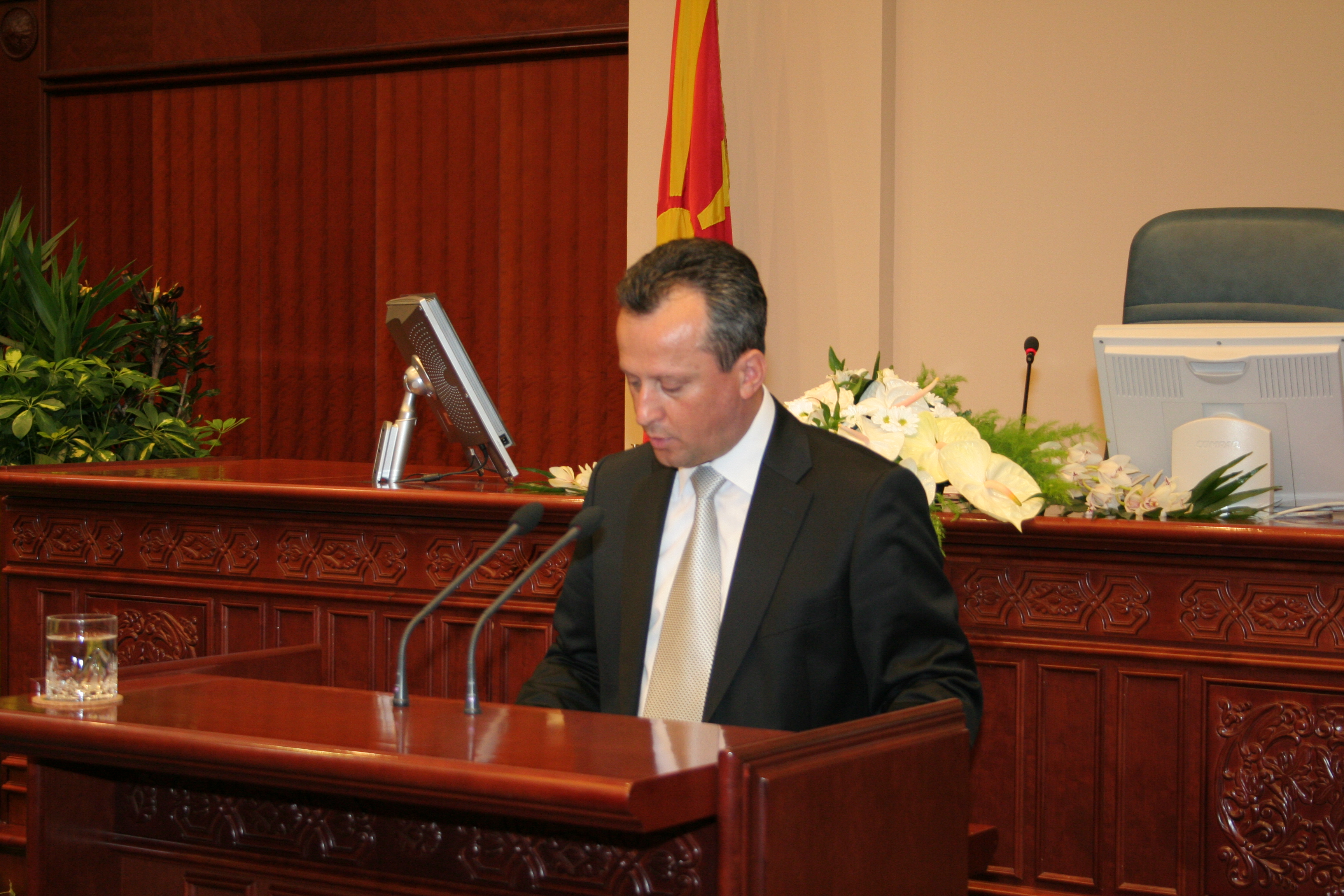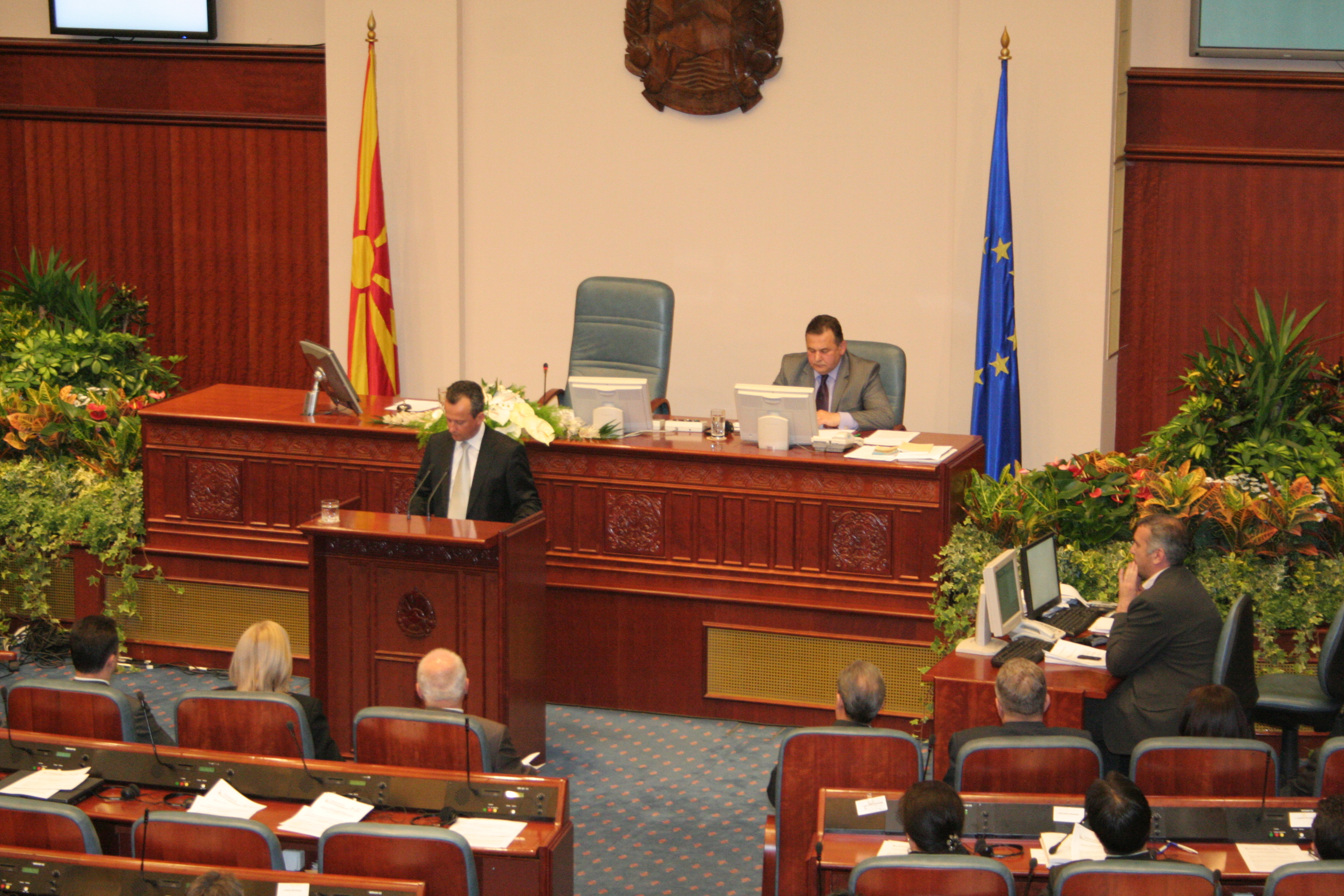Skopje, 5 May 2009
Address by the President of the Assembly of the Republic of Macedonia, Mr. Trajko Veljanoski on the occasion of the 60th Anniversary of the Council of Europe


Distinguished President and Members of the Government of the Republic of Macedonia Distinguished Fellow Parliamentarians, Excellencies, Ladies and Gentlemen, "I perceive these twelve stars as a reminder that the world can become a better place if we sometimes have the courage to look up at the stars." These words were voiced by Mr. Vaclav Havel 19 years ago from the Parliamentary Assembly of the Council of Europe. Today, Dear Friends, 47 stars shine in the Council of Europe, uniting about 800 million Europeans. The idea for a united Europe and establishment of a representative body that would be authorised to speak and act on behalf of all Europe dates back to the XIX century. Following the end of the Second World War numerous movements and organisations emerged committed to the unification of Europe. In 1947 these groups united and established the International Committee of the Movements for European Unity whose aim was to coordinate the activities and strengthen the efficiency of various European movements. The result was the famous Hague Congress held on 17 May 1948, known as the Congress of Europe. A year later, 60 years ago, ten European countries - Belgium, Denmark, France, Ireland, Italy, Luxembourg, Netherlands, Norway, Sweden and United Kingdom signed the Treaty of London, establishing the Council of Europe. The first step was thus made towards the realisation of a famous thought of one of the greatest European and world statesman, Sir Winston Churchill - "Let Europe arise"- voiced in his speech at the Zurich University in 1946.
Ladies and gentlemen,
60 years ago, when the Treaty of London was signed, Europe was still healing its deep wounds inflicted by one of the greatest tragedies in human history - the Second World War.
60 years ago the Iron Curtain had already dropped, dividing Europe into free states and peoples and peoples and states which only 40 years later, with the fall of the Berlin wall, would be able to feel the real freedom and democracy.
Indeed, today we could hardly imagine Europe as it is, if it was not for the visions and courage of Winston Churchill, Robert Schuman, De Gaspari, Adenauer and a series of other Europeans. Is it not a vision and courage that in the mentioned speech, Winston Churchill puts in the first place the real partnership and friendship between France and Germany as a condition for the creation of the European family? Today this friendship is reality and a true example to be followed by all the other countries in resolving historical antagonisms.
Distinguished friends,
The basic goals of the Council of Europe are peace, democracy and human rights - values and principles which are inseparable and complementary. Therefore, one of the first documents adopted by the Council of Europe was the European Convention for the Protection of Human Rights and Freedoms adopted in Rome in 1950. Respect and exercise of the provisions and principles of the Convention are today a sine qua non - without them there is no talk of human rights and democracy, and without human rights and democracy there is no peace. Therefore every society, every country, every Government, if it is to identify itself as being democratic, has to consistently respect and implement these principles.
Today, when we mark the 60th Anniversary, we may be pleased and proud to say that those visionary ideas and bravery have become reality.
In the 60 years of its existence, the Council of Europe has managed to bring together under common roof almost all the countries of the European continent -countries and peoples with different history, culture, languages, united around their joint interests and values - human rights and freedoms, democracy and rule of law.
With its actions, the Council of Europe has in the past period confirmed itself beyond the European continent. It represents today a real ethical power. Power which has in practice promoted itself through the European Court of Human Rights - this year marking its 50th anniversary, the Committee of Ministers representing the Governments of the Member States, the High Commissioner for Human Rights, the Venice Commission, and, obviously, the Parliamentary Assembly of the Council of Europe where interests are articulated of over 800 million Europeans through 318 elected representatives and equal number of their deputies. I have mentioned only a part, probably the most prominent, of the institutions functioning within the Council of Europe.
Ladies and Gentlemen,
Distinguished Friends,
As I mentioned in the beginning, 60 years ago the Iron Curtain has already dropped in Europe. Republic of Macedonia, as a part of the former SFRY, was unfortunately on the other side of the curtain where human rights, democracy and rule of law were subdued by an ideology.
The fall of the Berlin Wall brought about a fall of that ideology. In 1991, respecting the will of its citizens expressed at the Referendum, Republic of Macedonia became independent state, fulfilling all the conditions and principles by which a country characterises itself as a sovereign and independent entity in the international community. Unfortunately, at the very beginning, our southern neighbour imposed in the international community the absurd dispute over our constitutional name. The dispute delayed in the very beginning our full membership in international organisations, including the Council of Europe. Since 1993, Republic of Macedonia has been present in the Council of Europe with a special guest status, and in 1995 it became a full member.
Since becoming a full member, Republic of Macedonia has actively participated in the work of all the institutions within the Council of Europe, while at the same time responsibly carrying out its obligations stemming from the membership itself.
Among the first steps we made was the signing and ratification of the conventions adopted by the Council of Europe. I should start with the Convention for the Protection of Human Rights and Freedoms and all its subsequent protocols, that we ratified in 1997, until the most recently ratified Convention on the Prevention of Terrorism. However, the signing and ratification would be a dead letter if the Convention principles and provisions are not translated into legislation, and most importantly into practice.
Allow me to mention a couple of successful legal projects drafted with the assistance of the Council of Europe. The first example is the Law on the Ombudsman, closely related to human rights and freedoms, as it protects the citizens against violation of their rights by the state bodies. Allow me to recall that recently we have examined the Ombudsman Report, and what is particularly important, is that we have analysed it from two aspects. The first one is that the Ombudsman, as an independent institution, has continuously strengthened its position in the overall legal system and has been at the same time widely acknowledged among citizens as an institution which is always on their side. Furthermore, numerous system laws were adopted with the assistance of the Venice Commission and their expertise, including the election legislation, and the latest Constitutional amendments.
Ladies and Gentlemen,
Human rights and democracy are not static categories. Quite the opposite, they are dynamic categories that should be continuously upgraded. Republic of Macedonia, in the years of independence and transition, has demonstrated a remarkable trend that has identified us as a democratic country, respecting human rights and freedoms and the rule of law. This is even more important for us if we bear in mind that the Macedonian society is multi-ethnic, multi-cultural and multi-religious. Even in the most difficult periods for the state and the citizens, and here I mean the 2001 conflict, democratic methods and dialogue prevailed over arms. In that we were helped by our friends and international institutions, including the prominent role of the Council of Europe. Still, if the politicians and citizens had not demonstrated the necessary democratic capacity and that they value life and human dignity more than anything else, the conflict might have had much more tragic consequences for us and the region. The result of that dialogue was the Framework Agreement which we have successfully implemented legally, through the constitutional amendments and laws, and into practice.
We have enjoyed huge support by the international community and, obviously, by the Council of Europe. However, I have to stress the role of the Assembly of the Republic of Macedonia, as it was right here, in this house and this hall, that all the laws and constitutional changes were passed that derived from the Framework Agreement. And it is not only the current parliamentary mandate, but the previous ones as well.
Distinguished friends,
We have accepted the dialogue as a method of resolving open issues - and that is one of the basic principles upon which the Council of Europe is established -equally as a method of resolving the most absurd problem imposed by our southern neighbour, and that is our constitutional name. And it is precisely because it is an absurd problem and precedent in the international community that it has been difficult to resolve it. Still we do not give up on dialogue and negotiations that would lead to solution. Republic of Macedonia is prepared for a compromise, but a compromise that would not be damaging to our national, cultural or linguistic identity.
Ladies and gentlemen,
I believe I need not remind that the Council of Europe, over its 60 years of existence, has adopted many conventions and other documents concerning the protection of national, cultural and linguistic identity of even the smallest ethnic communities. Because it is precisely this richness of nationalities, cultures and languages that gives Europe its power. I should remind you that due to this absurd dispute, Macedonia failed to become full member of the NATO although it is recognized that accession to the Alliance is subject to fulfillment of standards relating to human rights, democracy and rule of law. I sincerely hope that now, as we await lifting of the visa regime and getting a date to start negotiations with the EU, what happened in Bucharest will not happen again.
Republic of Macedonia, its citizens and institutions, having fulfilled their obligations and given recommendations, deserve that. Is someone not brave enough to look up at these 12 stars of the Council of Europe flag, to rephrase the great European Havel? Has someone perhaps forgotten the Schuman's words that united Europe could only be created if principle of solidarity is respected? It remains to be seen.
Distinguished friends,
In past 60 years we have noted dynamic and historic changes in Europe. The dynamics in the world, and in our continent, however, continues and brings new challenges. At the moment, the biggest challenge for us all is obviously the world economic crisis, directly affecting millions of citizens of Europe and the world. Answers to these challenges will be sought and found, I am certain, by the Council of Europe, as well. I am saying this because the economic crisis has directly attacked the basic social rights which are part of the general human rights. I am certain at the same time that the Council of Europe and its bodies, starting from the Court of Human rights, Council of Ministers, Venice Commission through the Parliamentary Assembly of the Council of Europe, will continue to work successfully to the benefit of the 800 million Europeans, and thus to the world at large.
Allow me in the need to quote the words of the President of the Parliamentary Assembly of the Council of Europe, Mr. Lluis Maria de Puig " Sixty years ago, the founders had the power of their dreams. Today our power is quite real, it is the power of all the countries of a continent joined together. Let us not waste it, but use it in to its correct extent."
Thank you.